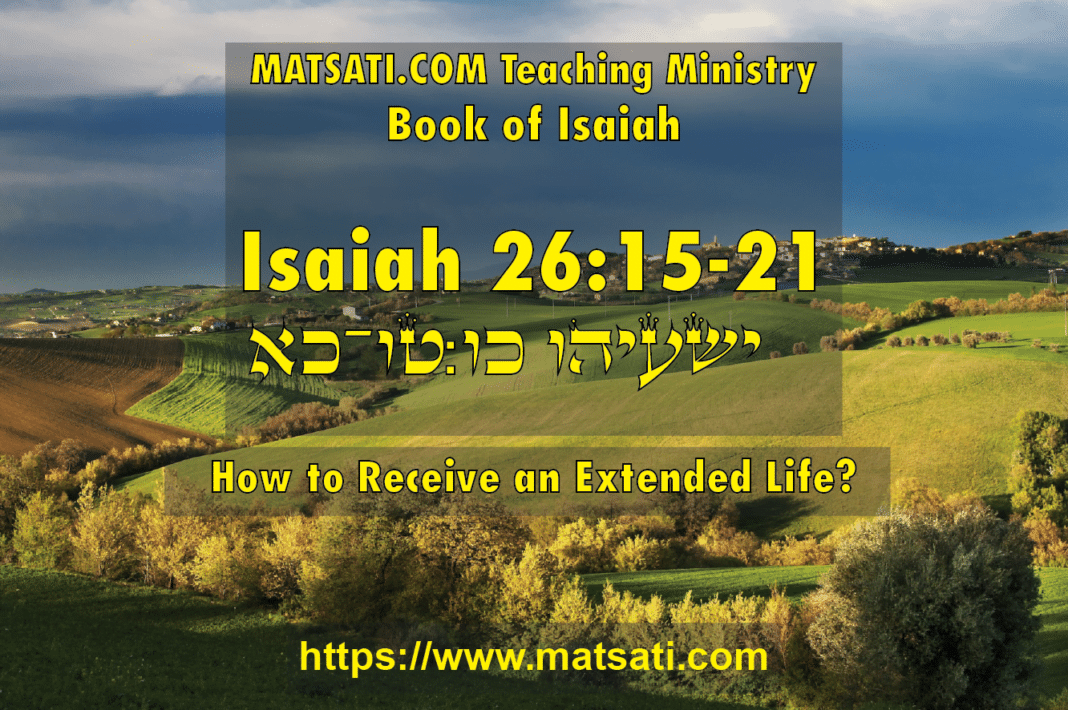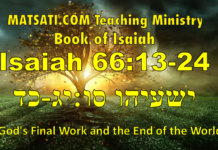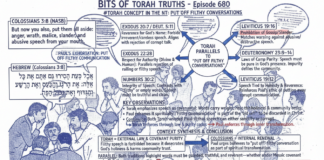Isaiah 26:15-21
One of the major reasons nations have come upon Israel was due to her unrepentant sins. We are told this over and over again according to the Scriptures. For those who are faithful, the Lord states that He will establish peace for His people according to Vayikra / Leviticus 26:6-8.
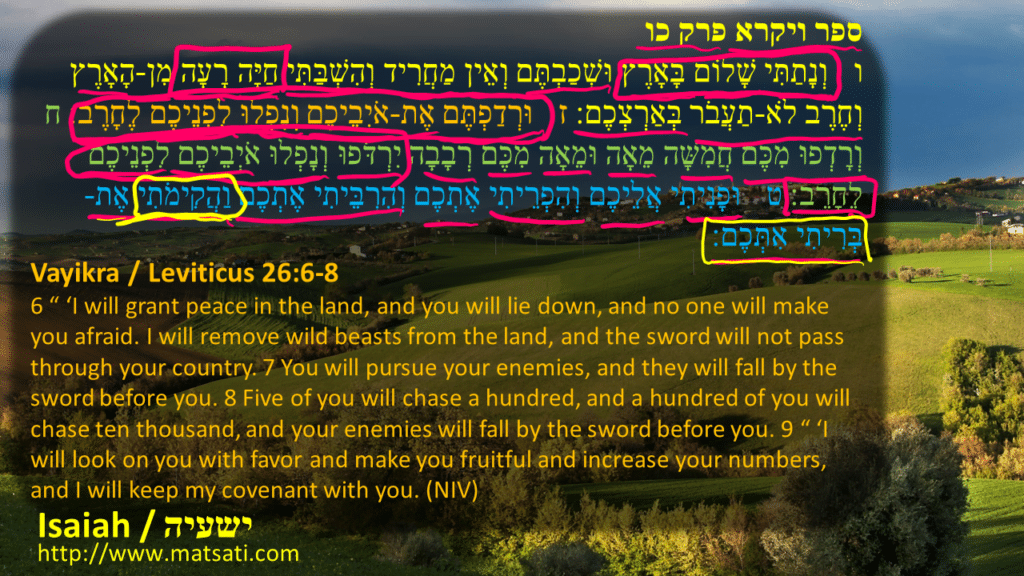
ספר ויקרא פרק כו
ו וְנָתַתִּי שָׁלוֹם בָּאָרֶץ וּשְׁכַבְתֶּם וְאֵין מַחֲרִיד וְהִשְׁבַּתִּי חַיָּה רָעָה מִן-הָאָרֶץ וְחֶרֶב לֹא-תַעֲבֹר בְּאַרְצְכֶם: ז וּרְדַפְתֶּם אֶת-אֹיְבֵיכֶם וְנָפְלוּ לִפְנֵיכֶם לֶחָרֶב: ח וְרָדְפוּ מִכֶּם חֲמִשָּׁה מֵאָה וּמֵאָה מִכֶּם רְבָבָה יִרְדֹּפוּ וְנָפְלוּ אֹיְבֵיכֶם לִפְנֵיכֶם לֶחָרֶב: ט וּפָנִיתִי אֲלֵיכֶם וְהִפְרֵיתִי אֶתְכֶם וְהִרְבֵּיתִי אֶתְכֶם וַהֲקִימֹתִי אֶת-בְּרִיתִי אִתְּכֶם:
Vayikra / Leviticus 26:6-8
26:6 And I will give peace in the land, and ye shall lie down, and none shall make you afraid: and I will rid evil beasts out of the land, neither shall the sword go through your land. 26:7 And ye shall chase your enemies, and they shall fall before you by the sword. 26:8 And five of you shall chase an hundred, and an hundred of you shall put ten thousand to flight: and your enemies shall fall before you by the sword. 26:9 For I will have respect unto you, and make you fruitful, and multiply you, and establish my covenant with you. (KJV)
Here the Lord says that He will bless His people with peace. When we do a survey upon the history of Israel, is this actually true? Liberal Christianity would have us believe that this is not the case and that somehow the God of the Torah, Neviim, and Ketuvim is different from the God of the NT. Context however is most important, and knowing how Vayikra / Leviticus 26 begins, answers the questions on why peace was so fleeting in the history of Israel. We note the context of the opening verse in Parashat Bekhukotai פרשת בחקותי, ג אִם-בְּחֻקֹּתַי תֵּלֵכוּ וְאֶת-מִצְוֹתַי תִּשְׁמְרוּ וַעֲשִֹיתֶם אֹתָם: (Vayikra / Leviticus 26:3) makes the statement “if you walk in my statutes and obey my commandments to keep them.” This is a very important concept being taught by the Torah. Note we go into depth discussing on this in Isaiah 25:7-12 study here https://www.matsati.com/index.php/the-ignorance-of-the-nations-in-their-understanding-the-revelation-of-god-at-sinai-isaiah-257-11/ asking the question of how to have an extended life? The Lord God Himself said that he will add days to our lives if we listen and obey. This is what the opening verse in Parashat Bekhukotai is saying according to Vayikra / Leviticus 28:3.
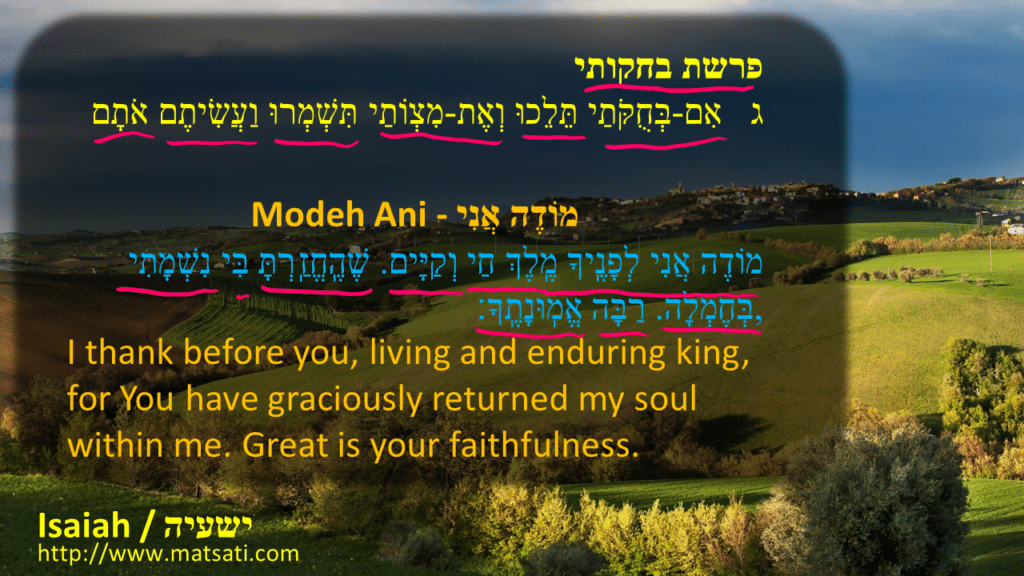
פרשת בחקותי
ג אִם-בְּחֻקֹּתַי תֵּלֵכוּ וְאֶת-מִצְוֹתַי תִּשְׁמְרוּ וַעֲשִֹיתֶם אֹתָם
The key to understanding this is in the context of sin vs. righteousness. Liberal Christians do not want to be faced with the consequences for their sins! They want only the mercy and grace of God without the effort of remaining faithful to a Holy and Righteous God! The Lord God Almighty is sovereign and Lord over all! The Lord God has given His holy Word so that we do not forget what He has promised and what He has done on behalf of His people. We note that God’s protection of Israel, its continued existence as a nation for thousands of years, is evidence for the love that God has for His people. We note that Israel triumphs because the Lord God Almighty is on their side! The correct perspective is to realize that it is the Lord who protects us, and who has provided the circumstances for our survival. These things are all captured in the Siddur, the liturgical prayers for the Torah observant. For example, when awakening in the morning, the rabbis believe it is the grace and mercy of God who restores the soul within us so that we can experience another day of life. Their belief is that when we wake up, this is analogous to the resurrection from the dead and the power of God over life and death. The Lord God revives us each day from the depths of our sleep and miraculously enables us to wake up, open our eyes, and live for Him another day. The Modeh Ani is the first blessing that is said upon rising from bed, to express our gratitude to God for the gift of life and for a new day.
Modeh Ani – מוֹדֶה אֲנִי
מוֹדֶה אֲנִי לְפָנֶֽיךָ מֶֽלֶךְ חַי וְקַיָּים. שֶׁהֶֽחֱזַֽרְתָּ בִּי נִשְׁמָתִי ,בְּחֶמְלָה. רַבָּה אֱמֽוּנָתֶֽךָ׃
I thank before you, living and enduring king, for You have graciously returned my soul within me. Great is your faithfulness.
In addition to this, the rabbinic tradition guides one to personally bless the Lord for every detail of our daily experience. This process is supposed to enable a deep inward appreciation for the good things that God has provided for us throughout the day. Examples from the Siddur are blessings when waking up, when smelling spices, smelling fruit, eating fruit, eating vegetables, eating grain, grace before meals, the prayer of thankfulness before Torah study and after Torah study, for bearing burdens, for God meeting our needs, affirming God’s Sovereignty, the evening blessing and the bedtime blessing, just to name a few. We note again that Kavanah, the intention of the heart, is essential for true prayer! Remember that Kavanah is having the proper intention, pure intentions, and in innocence when we stand before God through prayer. Kavanah also involves concentration, single-mindedness, worship, and earnest passion of the whole heart when seeking the Lord. (See Jeremiah 29:13 and Hebrews 11:6). The point is that one does not pray simply by having the correct words. Seeking only the correct words is cultic and misses the point of prayer to a personal and loving God. The idea is that we speak from our heart with honesty, otherwise the question should be asked, will the Lord honor any other kind of prayer? Again, we find how the narrative follows along this line of thought on our motivations. We cannot go to the Lord God in prayer with a prideful heart! We cannot go to the Lord while actively living in unrepentant sin! David recognized this when he wrote Tehillim / Psalms 66:18. We also cannot go to the Lord when sitting at the feet of idolatry! We cannot go to the Lord in prayer if we make wealth and our possessions and our jobs, sports, or some form of entertainment of more importance than faith and faithfulness to the Lord God Almighty and Yeshua His Messiah! These are the things that Isaiah is speaking of and has been demonstrating for us from the beginning of his book, Isaiah 1-26! The proper intention should be for our continual recognition that the Lord is to be blessed and praised, He is to whom credit is given for all that we have, and our lives are to be directed to serving Him no matter what the circumstance! The centrality of our lives is to walk with the Lord in the footsteps of the Messiah Yeshua! The major point of what Isaiah is telling us is exactly what Yeshua taught. A major aspect of His message was that “I have come that they may have life, and that they may have it more abundantly” (John 10:10). This is achieved through drawing near to the Lord in His word and applying God’s word to our lives each day!
Isaiah gives praise to the Lord for what He has done as we read on according to Isaiah 26:15.
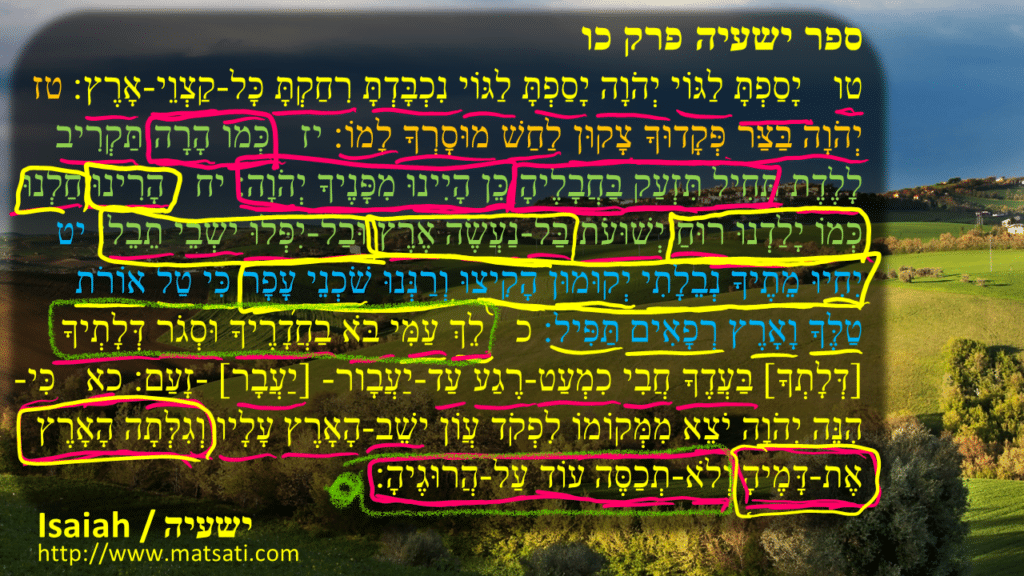
ספר ישעיה פרק כו
טו יָסַפְתָּ לַגּוֹי יְהֹוָה יָסַפְתָּ לַגּוֹי נִכְבָּדְתָּ רִחַקְתָּ כָּל-קַצְוֵי-אָרֶץ:
Isaiah 26:15 states, “Thou hast increased the nation, O LORD, thou hast increased the nation: thou art glorified: thou hadst removed it far unto all the ends of the earth. (טו יָסַפְתָּ לַגּוֹי יְהֹוָה יָסַפְתָּ לַגּוֹי נִכְבָּדְתָּ רִחַקְתָּ כָּל-קַצְוֵי-אָרֶץ:)” Here Isaiah speaks to a future expectation, that what is happening to Israel is the work of God! Regardless of how oppressive a nation is against Israel; the Lord continues to increase the people through blessing according to the promise that He had made to Abraham. Isaiah could also be speaking here to the final restoration that we had read about previously and similar to what we see in Isaiah 33:17.
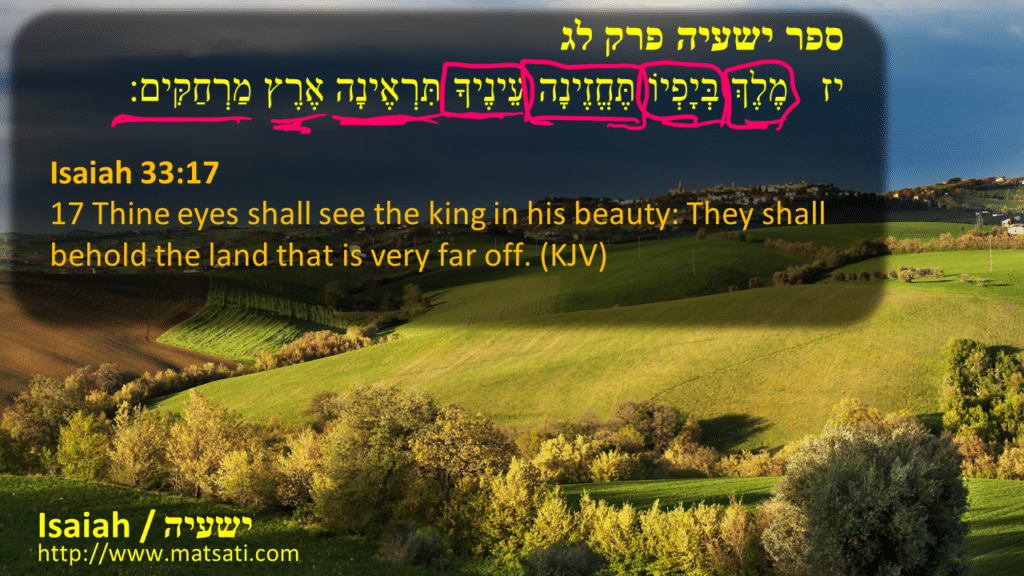
ספר ישעיה פרק לג
יז מֶלֶךְ בְּיָפְיוֹ תֶּחֱזֶינָה עֵינֶיךָ תִּרְאֶינָה אֶרֶץ מַרְחַקִּים:
Isaiah 33:17
17 Thine eyes shall see the king in his beauty: They shall behold the land that is very far off. (KJV)
Here Isaiah speaks to seeing the land that is at a great distance, alluding to the diaspora. We note that the Lord God preserves His people whereas their oppressors disappear. We can see the mercy of God that is found in these things. The ancient middle eastern fertility religions sought to manipulate occult practices to increase one’s offspring and a nation’s place in this world. The Lord God Almighty however in the Torah promised His people that same result of extended life and fertility only if His people would walk in His ways! (See Devarim / Deuteronomy 28) We have to keep in mind that the world seeks to destroy our faith in the Lord God and His Messiah Yeshua. Many times, throughout our lives, we encounter events that seem to contradict our convictions. This may simply be a testing of our faith, or that events might just randomly happen in the way that they do. In these situations, a believer is brought face to face with how to deal with these events in life while maintaining faith and faithfulness to God! The point is that we recognize that we cannot deliver ourselves, we need the Lord to deliver us from any situation that comes our way. We note that this is what we have been reading about according to Isaiah thus far, that we are incapable of delivering ourselves. When man trusts in man, the end outcome is disaster. (See Isaiah 8:16-22, 24:1-23, 30:1-5, 39:5-7, Jeremiah 17:5-8) The victory of the Lord God in heaven is frequently demonstrated according to Isaiah 9:1-6 Eng. 2-7, 12:1-6, 25:1-9, 30:18, 32:14-20, 35:1-10, and 37:3-7. The inability of man to save himself, even to keep the mitzvot in the Torah, this is why Paul spoke of the Torah directing us to the Messiah of God. The NT Torah centric message of God dwelling in our midst through the indwelling of the Holy Spirit, we are told the Lord God Almighty works in our lives when we live according to the Spirit, the Lord helps us to turn from sin, and to walk in His ways, to remain faithful, and to stand up against injustice and stand for truth, life, and righteousness! Note that standing for justice, this is connected to truth, as in the case of being wrongfully convicted. This has nothing to do with the woke social justice that is promoted by the liberals. (See Galatians 5:16-26, Ephesians 5:18-23)
Isaiah continues saying the following according to Isaiah 26:16.
ספר ישעיה פרק כו
טז יְהֹוָה בַּצַּר פְּקָדוּךָ קוּן לַחַשׁ מוּסָרְךָ לָמוֹ:
Isaiah 26:16 states, “LORD, in trouble have they visited thee, they poured out a prayer when thy chastening was upon them. (טז יְהֹוָה בַּצַּר פְּקָדוּךָ צָקוּן לַחַשׁ מוּסָרְךָ לָמוֹ:)” Here commentators say that this verse is very obscure (i.e. John Oswalt). The point Isaiah is making here is that when bad things happen to us, these things turn our hearts to seeking our Father in heaven! We note what the DSS writes concerning these things:
| DSS – 4Q504 Frags. 1–2 v:15-16 | |
| 15 [כי]א יצקתה את רוח קודשכה עלינו16 [לה]ביא ברכותיכה לנו ל{מ}פקודכה בצר לנו | 15 [Fo]r you have poured your holy spirit upon us, 16 [to be]stow your blessings to us, so that we would look for you in our anguish, |
The DSS records an ancient interpretation, that God pours out His holy Spirit upon His people and bestows blessing upon His people when we look to Him in our anguish. This speaks to the point of remaining faithful. The blessing the Lord provides is that of having peace in our hearts to know that He is with us! Isaiah speaks of chastening, which is something a father does to his children. This parallels what our Father in heaven does for His people. If we do not see chastening in our lives, we should seriously ask ourselves whether we are actually His children or not? The point of chastisement is to draw us back to the correct way, so we do not grow up in disobedience. The chastisements are meant not to drive us away from the Lord but to draw us near. But we must also remember, when we do things in disobedience (see Jeremiah 17:5-8) our sins may lead to terrible consequences, health, financial, relationships, etc that are our own fault. When bad things happen, they may be simply the result of reaping the consequences of our unfaithfulness. We need to be able to recognize these things in our lives, so that we can discern the differences, and not turn from the faith, but strengthen our faith and resolve to seek repentance and seek the help of the Lord to get us out of what our own hands have created! Here the context Isaiah has given us thus far is related to the sins of Israel, her griefs are due to her own unrepentant sinfulness. (Isaiah 41:23-24, 45:7, and Amos 3:6). These things remind us that we need to be aware of our own sinfulness, and recognize how we are so desperately wicked, and how it is only by the righteousness, mercy, and grace of God that saves us!
Isaiah continues according to Isaiah 26:17-18.
ספר ישעיה פרק כו
יז כְּמוֹ הָרָה תַּקְרִיב לָלֶדֶת תָּחִיל תִּזְעַק בַּחֲבָלֶיהָ כֵּן הָיִינוּ מִפָּנֶיךָ יְהֹוָה: יח הָרִינוּ חַלְנוּ כְּמוֹ יָלַדְנוּ רוּחַ יְשׁוּעֹת בַּל-נַעֲשֶֹה אֶרֶץ וּבַל-יִפְּלוּ יֹשְׁבֵי תֵבֵל:
Isaiah 26:17 states, “Like as a woman with child, that draweth near the time of her delivery, is in pain, and crieth out in her pangs; so have we been in thy sight, O LORD. (יז כְּמוֹ הָרָה תַּקְרִיב לָלֶדֶת תָּחִיל תִּזְעַק בַּחֲבָלֶיהָ כֵּן הָיִינוּ מִפָּנֶיךָ יְהֹוָה:)” Isaiah 26:18 “We have been with child, we have been in pain, we have as it were brought forth wind; we have not wrought any deliverance in the earth; neither have the inhabitants of the world fallen. (יח הָרִינוּ חַלְנוּ כְּמוֹ יָלַדְנוּ רוּחַ יְשׁוּעֹת בַּל-נַעֲשֶֹה אֶרֶץ וּבַל-יִפְּלוּ יֹשְׁבֵי תֵבֵל:)” This idea of giving birth illustrates the level of distress, that as the birth gets closer, the distress increases, and Isaiah is using this analogy to describe what is happening due to sin. We note a parallel to something James wrote concerning sin according to James 1:14-15.
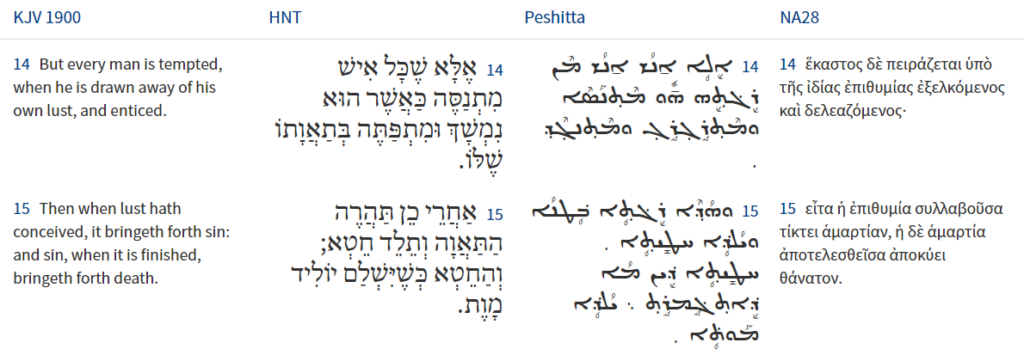
Here James speaks of sin being sourced from our own lusts. He too draws upon this idea of birth and conception, in his discussion on how sin is conceived. James also provides this idea of being given a child, and when labor comes lust is born. This is the concept of how one brings forth sin by his or her actions and death. We note that the labor and pain ends in joy upon the birth of a child, whereas for the birth of sin and death, the outcome is not joy. Note what Isaiah says according to Isaiah 37:3 “And they said unto him, Thus saith Hezekiah, This day is a day of trouble, and of rebuke, and of blasphemy: for the children are come to the birth, and there is not strength to bring forth.” (KJV) This parallels the idea that if a woman has no power to bring forth the child, she may die in the birthing process. We take note of the Greek LXX rendition of Isaiah 26:18 ἐν γαστρὶ ἐλάβομεν καὶ ὠδινήσαμεν καὶ ἐτέκομεν, πνεῦμα σωτηρίας σου ἐποιήσαμεν ἐπὶ τῆς γῆς, ἀλλὰ πεσοῦνται οἱ ἐνοικοῦντες ἐπὶ τῆς γῆς. 18 Because of fear of you, O Lord, we conceived in the womb and had pangs and gave birth; we made a wind of your deliverance on the land, but all those who dwell on the land will fall. (LES) In the MSS, Isaiah speaks to being pregnant with child, of pain, and then of bringing forth “wind” רוּחַ which is translated into Greek as πνεῦμα meaning “breath, wind, spirit, disposition.” This may be a stretch, but the use of רוּחַ / πνεῦμα draws in this idea of giving birth or bringing forth something spiritual. This would follow along the lines of the first century interpretation from James 1:15 regarding our thoughts and our actions. These things also reveal to us how everything we do is spiritual and has spiritual consequences. There is no ambiguity here in Isaiah 26:18. The spiritual fruit that the people bring forth by the way they live their lives, this has led to their current circumstances. The Concise New International Dictionary of NT Theology writes that “The noun πνοή refers to the act of blowing or breathing, but it may also mean simply “wind, breeze, breath;” πνοὴ θεοῦ can denote the inspiration of a god (Eurip. Bacch. 1094). Built on this noun are several compounds. The noun πνεῦμα came to serve as a synonym of πνοή in various contexts, but it became far more common. Plato, e.g., uses πνοή only twice, but πνεῦμα c. 50×, and the disparity is much greater in Aristotle. The air that people breathe was thought to be the bearer of life, so that to discontinue breath means to die. From the 5th century onward, Greek physicians developed a physiology based on this concept and soon drew a distinction between a person’s inward, innate πνεῦμα and the air that was breathed. In Aristotle, this πνεῦμα was the formative power that, from the embryo onward, gradually produced the mature individual and became the instrument whereby the soul controlled the body.” (Christopher A. Beetham, ed., “Πνεῦμα,” Concise New International Dictionary of New Testament Theology and Exegesis (Grand Rapids, MI: Zondervan Academic, 2021), 749.) This historical analysis adds a lot of context to what we are reading about here in Isaiah. Note how when we couple this spiritual aspect of sin to the ancient belief of πνεῦμα that breath was life and the soul that controls the body, here to give birth to something that is not alive, sin, iniquity, unrighteousness, this leads to this concept of discontinuing breathing and death according to James’ interpretation. Note also the connection of sin to the soul. It is interesting how it is possible to back out the NT first century interpretations directly from the Greek and Hebrew texts. This is why walking away from God’s Torah, from His holy and righteous ways, leads to death! Deliverance comes to those who seek forgiveness, walk in repentance, and desire to draw near to the Lord. The overarching power of sin leads to our need for help from the Lord to overcome sin. Historically we see how the people were unable to deliver themselves, and similarly today we too are unable to deliver ourselves! All of these things lead us back to utterly trusting in the Lord, since we have no power within ourselves to overcome. It is only the faithfulness of God, His power, His help, that we are able to even have faith! These things teach us the importance of bearing the testimony of God, to continue in faith and faithfulness no matter what happens. Even if our faith and faithfulness lead to death, being killed by the nations, this life was not lived in vain, it brought glory to the most High, to our Father in heaven and to His Messiah Yeshua! For those who struggle with oppressive regimes, who are persecuted because of one’s faith, and even die (are killed or put to death) because of these truths here one cannot say “look here, there is no apparent result to their faithfulness.” The truth of the matter is they bore the testimony of God up until the end! This has brought great glory to God, and great is their reward! The struggles we go through strengthen us to bear the testimony of faithfulness that is characteristic of those who believe in God our Father in heaven, and in his Messiah Yeshua!
Isaiah continues saying the following according to Isaiah 26:19.
ספר ישעיה פרק כו
יט יִחְיוּ מֵתֶיךָ נְבֵלָתִי יְקוּמוּן הָקִיצוּ וְרַנְּנוּ שֹׁכְנֵי עָפָר כִּי טַל אוֹרֹת טַלֶּךָ וָאָרֶץ רְפָאִים תַּפִּיל:
Isaiah 26:19 states, “Thy dead men shall live, together with my dead body shall they arise. Awake and sing, ye that dwell in dust: for thy dew is as the dew of herbs, and the earth shall cast out the dead. (יט יִחְיוּ מֵתֶיךָ נְבֵלָתִי יְקוּמוּן הָקִיצוּ וְרַנְּנוּ שֹׁכְנֵי עָפָר כִּי טַל אוֹרֹת טַלֶּךָ וָאָרֶץ רְפָאִים תַּפִּיל:)” We note something very significant here. Isaiah believes in the resurrection of the dead. This is illustrated in the Hebrew bible which states, יִֽחְי֣וּ מֵתֶ֔יךָ נְבֵלָתִ֖י יְקוּמ֑וּן הָקִ֨יצוּ וְרַנְּנ֜וּ שֹׁכְנֵ֣י עָפָ֗ר “The will be alive, your dead and my dead body will be raised wake up together those who reside dust.” Note how this parallels Daniel 12:2 and the clear statements of the resurrection of the dead. The Greek and Aramaic translation also say something very similar according to Isaiah 26:19.
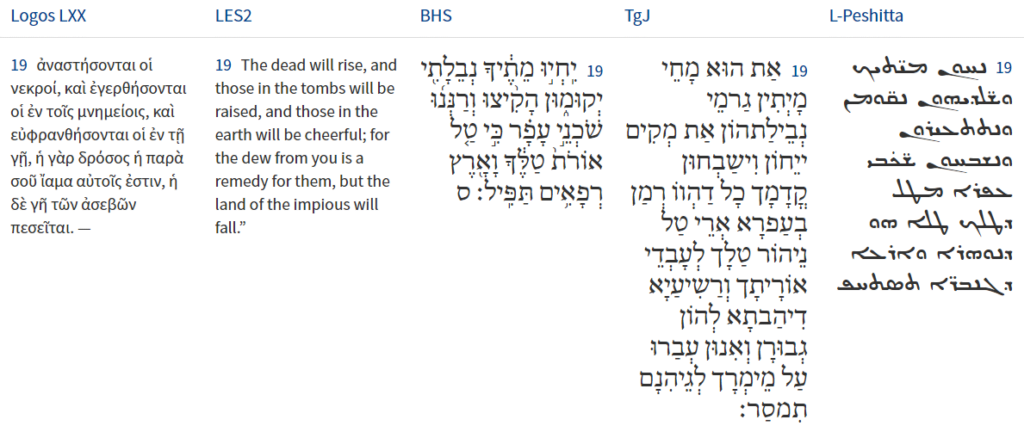
The Targum writes the following “19 Thou art he who dost quicken the dead, the bones of their dead bodies thou dost raise up. They shall live, and offer praise before thee, all that were cast into the dust, because thy dew is the dew of light to them who do thy law; but thou wilt deliver the wicked into hell, to whom thou hast given power, for they have transgressed against thy WORD.” (TgJ) Notice how the TgJ parallels the wicked to those who transgress against God’s Word. He is not specifying any particular part of God’s word, but simply states that transgression leads to the classification of wickedness. The TgJ also clearly defines the place of the righteous and the wicked at the moment of the resurrection. Those who are righteous will be raised to everlasting life and will offer praises to the Lord forever. The wicked however will be consigned to hell a place of eternal torment. The LXX translates the MSS stating, “The dead will rise, and those in the tombs will be raised, and those in the earth will be cheerful; for the dew from you is a remedy for them, but the land of the impious will fall.” Here the LXX starts with the word ἀναστήσονται a future middle indicative third person verb from the root ἀνίστημι (anistēmi) meaning “to raise,” and figuratively “bring back to life.” When ἀνίστημι is applied to someone who has died, the resulting meaning is “to raise [from the dead], bring back to life.” (Homer Il. 24.551) The verb ἀνίστημι occurs in the LXX over 500×, but almost always in its common, everyday senses (“to rise, stand up, raise, set up”). This verb generally is used to render the Hebrew verb קום and because of this the Greek word sometimes takes on the meaning “to establish, confirm” (see Bereshit / Genesis 9:9, 2 Chronicles 6:10). In several passages it is predicated specifically with reference to the dead and therefore indicates resurrection (see Tehillim / Psalms 88:10 [LXX 87:11] 2 Maccabees 12:44, and in our text here from Isaiah 26:19). The pre-exilic portions of the Tanakh are widely considered to contain no statements that enable one to recognize a hope of resurrection from the dead, this is why the Sadducees did not believe in the resurrection of the dead. Death is typically pictured as the definite end, the destruction of human existence (see Bereshit / Genesis 3:19 and Job 30:23). This concept is not invalidated by the accounts of isolated individuals returning to life, for example, the widow’s son in Zarephath (1 Kings 17:17-22), the Shunammite’s son (2 Kings 4:18-37), and the man thrown hurriedly into Elisha’s grave (2 Kings 13:20-21) touching his bones was raised back to life. The fact that Enoch (Bereshit / Genesis 5:24) and Elijah (2 Kings 2:11) did not die, highlights the point of there being life after death. This also provides a general hope for life after death that God is able to do anything, even raise us from the dead, just as we read according to Daniel 12:2 and the NT. We note the general attitude to death in Job’s words to his friends according to Job 7:7-10. The fact of the matter is that both Enoch and Elijah prove our existence beyond earthly life in general. Clearly without a doubt, Isaiah believes in the resurrection of the dead. In addition, those who translated the LXX also believed in God’s power to overcome death! Isaiah asserts that the dead will be revived with shouts of joy to partake in the festivities of God’s final triumph. The idea is that we are to endure suffering for our faith because there is life after death. (See Romans 8:18–25, 1 Corinthians 15:20–28, Hebrews 12:1–2, Revelation 2:7, 2:10-11, 2:17, 2:26–29, 14:13, etc.) We note that death does not separate us from God, and that He is the living God, the God of Life, and so we will be given new bodies, better than these we currently have here on earth! Isaiah opens Isaiah 26:19 with the great joy that follows the resurrection of the righteous.
Isaiah concludes chapter 26 saying the following according to Isaiah 26:20-21.
ספר ישעיה פרק כו
כ לֵךְ עַמִּי בֹּא בַחֲדָרֶיךָ וּסְגֹר דְּלָתְיךָ [דְּלָתְךָ] בַּעֲדֶךָ חֲבִי כִמְעַט-רֶגַע עַד-יַעֲבָור- [יַעֲבָר] -זָעַם: כא כִּי-הִנֵּה יְהֹוָה יֹצֵא מִמְּקוֹמוֹ לִפְקֹד עֲוֹן ישֵׁב-הָאָרֶץ עָלָיו וְגִלְּתָה הָאָרֶץ אֶת-דָּמֶיהָ וְלֹא-תְכַסֶּה עוֹד עַל-הֲרוּגֶיהָ:
Isaiah 26:20 states, “Come, my people, enter thou into thy chambers, and shut thy doors about thee: hide thyself as it were for a little moment, until the indignation be overpast. (כ לֵךְ עַמִּי בֹּא בַחֲדָרֶיךָ וּסְגֹר דְּלָתְיךָ [דְּלָתְךָ] בַּעֲדֶךָ חֲבִי כִמְעַט-רֶגַע עַד-יַעֲבָור- [יַעֲבָר] -זָעַם:)” Isaiah 26:21 “For, behold, the LORD cometh out of his place to punish the inhabitants of the earth for their iniquity: the earth also shall disclose her blood, and shall no more cover her slain. (כא כִּי-הִנֵּה יְהֹוָה יֹצֵא מִמְּקוֹמוֹ לִפְקֹד עֲוֹן ישֵׁב-הָאָרֶץ עָלָיו וְגִלְּתָה הָאָרֶץ אֶת-דָּמֶיהָ וְלֹא-תְכַסֶּה עוֹד עַל-הֲרוּגֶיהָ:)” Here is a divine invitation, as a bride is invited into the husband’s chambers. These are statements of salvation and compassion of God which provides us with a great hope for waiting upon the Lord and seeking our Father in heaven for help. We are told according to the Scriptures that all men, regardless of nationality, language, or tribe, are called to respond to his divine invitation (Matthew 18:14, 2 Peter 3:9) and anyone may partake and find refuge in his mercy and grace. The Lord God is coming to pay retribution to those who refuse to repent from their iniquity. In fact, the Lord God is so powerful, that even the earth will give up its dead. And when the Lord comes, and the resurrection of the dead occurs, blessing and punishment will be meted out. This stands as an ancient warning for all peoples! This logically should lead to faith, and a healthy fear of the Lord. We note that something here, Isaiah says וְגִלְּתָ֤ה הָאָ֙רֶץ֙ אֶת־דָּמֶ֔יהָ “and expose the earth her blood,” this is reminiscent of what we read according to Bereshit / Genesis 4:10.
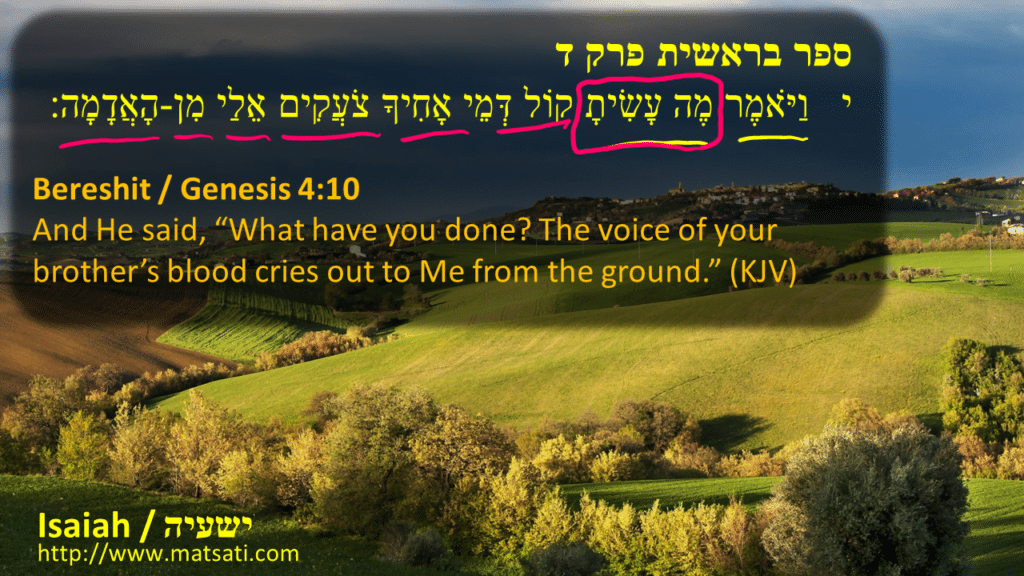
ספר בראשית פרק ד
י וַיֹּאמֶר מֶה עָשִֹיתָ קוֹל דְּמֵי אָחִיךָ צֹעֲקִים אֵלַי מִן-הָאֲדָמָה:
Bereshit / Genesis 4:10
And He said, “What have you done? The voice of your brother’s blood cries out to Me from the ground.” (KJV)
Note how the earth soaks up the blood of the slain. These words of Isaiah suggest how the earth will testify to the blood that was shed, and the wicked will be punished. The blood that was spilled with give a full accounting when all of the murdered will be brought back to life. Notice that there is no escape, no way to hide from the truth! We will all face our sins before the holy and living God. For those who have not been forgiven by faith in Yeshua the Messiah, they will bear the punishment for their sins, as the TgJ writes, the dead will be delivered to hell! Isaiah is reminding us today to repent and turn from our sins. And any effort that is made without the help of God is futile.
Rabbinic Literature
The Targum Jonathan is an Aramaic and Rabbinic interpretation of the book of Isaiah and is therefore a valuable resource for our study of Isaiah.
תרגום יונתן בן עוזיאל אל ישעיה פרק כו:טו-כא
טו אִתגְלִיתָא לְכַנָשָא מְבֻדְרֵי עַמָך יוי אַף עְתִיד אַת לְקָרָבָא גָלְוָתְהֹון לְאִתגְלָאָה בִגבוּרְתָך לְרַחָקָא כָל רַשִיעַיָא לְגֵיהִנָם׃ טז יוי בְעָקָא הָוַן דְכִירִין לְדַחלְתָך בְעָקָתהֹון הְוֹו מַלְפִין אֻלפַן אֹורָיתָך בוּחשַי׃ יז כִמעַדְיָא דִבעִדָן מֹולְדַא זָיְעָא וּמַצוְחָא בְחִבלַהָא כֵין הְוֵינָא מִן קֳדָם דְחַבנָא קֳדָמָך יוי׃ יח אֹוחִיתַנָא עָקָא דִמעַדיָא דִבעִידָן דְעִדָן מֵילְדַה קַלִיל כְרוּחָא פוּרקָן לָא אֵיתִיאוּ אַרעָא לָא עְבַדוּ אַף פְרִישָן לָא יִכְלוּן לְמַעְבַד דְדָיְרִין בְתֵבֵל׃ יט אַת הוּא מָחֵי מָיְתִין גַרמֵי נְבֵילַתהֹון אַת מְקִים ייֵחֹון וִישַבְחוּן קֳדָמָך כָל דַהְוֹו רְמַן בְעַפרָא אְרֵי טַל נֵיהֹור טַלָך לְעָבְדֵי אֹורָיתָך וְרַשִיעַיָא דִיהַבתָא לְהֹון גְבוּרָן וְאִנוּן עְבַרוּ עַל מֵימְרָך לְגֵיהִנָם תִמסַר׃ כ אִיזֵיל עַמִי עְבֵיד לָך עוּבָדִין טָבִין דְיַגְנוּן עְלָך בְעִדָן עָקָא אִיטְמַר כִזעֵיר זְמָן עַד דְיִעדֵי לְוָט׃ כא אְרֵי הָא יוי מִתגְלֵי מֵאְתַר בֵית שְכִינְתֵיה לְאַסעָרָא חֹוב יָתֵיב אַרעָא עְלֹוהִי וּתגַלֵי אַרעָא עַל דַם זַכַי דְאִתאְשַד בַה וְלָא תְכַסֵי עֹוד עַל קְטִילַהָא׃
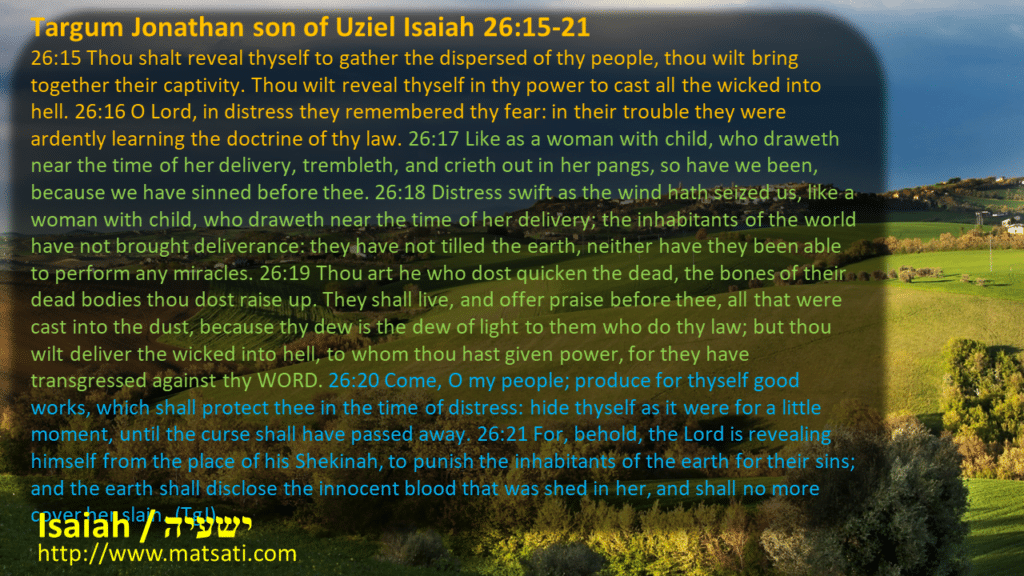
Targum Jonathan son of Uziel Isaiah 26:15-21
26:15 Thou shalt reveal thyself to gather the dispersed of thy people, thou wilt bring together their captivity. Thou wilt reveal thyself in thy power to cast all the wicked into hell. 26:16 O Lord, in distress they remembered thy fear: in their trouble they were ardently learning the doctrine of thy law. 26:17 Like as a woman with child, who draweth near the time of her delivery, trembleth, and crieth out in her pangs, so have we been, because we have sinned before thee. 26:18 Distress swift as the wind hath seized us, like a woman with child, who draweth near the time of her delivery; the inhabitants of the world have not brought deliverance: they have not tilled the earth, neither have they been able to perform any miracles. 26:19 Thou art he who dost quicken the dead, the bones of their dead bodies thou dost raise up. They shall live, and offer praise before thee, all that were cast into the dust, because thy dew is the dew of light to them who do thy law; but thou wilt deliver the wicked into hell, to whom thou hast given power, for they have transgressed against thy WORD. 26:20 Come, O my people; produce for thyself good works, which shall protect thee in the time of distress: hide thyself as it were for a little moment, until the curse shall have passed away. 26:21 For, behold, the Lord is revealing himself from the place of his Shekinah, to punish the inhabitants of the earth for their sins; and the earth shall disclose the innocent blood that was shed in her, and shall no more cover her slain. (TgJ)
This text has traditionally been interpreted using resurrection themes according to the Rabbinic literature and the Greek translation of the Tanakh (LXX) where the power of God is present to give life to those who have died. Job provides his opinion when he says in Job 7:9 that “he who goes down to the grave does not return.” It is in Daniel 12:2 that we read that the Tanakh explicitly states that there is a bodily resurrection. Ezekiel 37:4-14 God provides Ezekiel with a vision of the valley of dry bones, which also reveals God’s ability to reawaken a dead nation and to revive a covenantal community. The IVP Bible Background Commentary writes the following:
“There are several different concepts of afterlife that are evidenced in the ancient Near East. The most fundamental concept is continued existence in a gravelike netherworld where there is no differentiation in the treatment of the righteous and wicked. The Israelites called this place Sheol (see comments on Is 14:9), and they believed that it allowed for no interaction with God. In Canaan and Mesopotamia netherworld deities governed this realm. In Egypt the netherworld existence is more congenial for those who pass the judgment and enter its confines. Those who are not approved are devoured. None of these concepts include the idea of resurrection out of the netherworld. In general, in the ancient worldview the only awakening that took place was the calling up of spirits of the dead (which was not permanent and not a bodily presence) or the awakening of the fertility gods of nature cycles. These died annually when the agricultural cycle came to an end and “wintered” in the netherworld. Then they were ritually awakened in the spring. None of this bears any resemblance to a theological doctrine of resurrection. Likewise not comparable are the occasional revivifications (when an individual is restored to life) or the indications of national return to life (Ezekiel’s dry bones). A fully developed doctrine of resurrection in the modern sense includes six elements: (1) it is individual, not national; (2) it is material, not spiritual; (3) it is universal, not isolated; (4) it takes place outside the netherworld; (5) it leads to permanent immortality; and (6) it involves distinctions between the righteous and the wicked. Zoroastrianism appears to have all of these elements, but the nature of the sources makes it difficult to determine how early the Persians developed these concepts.”
Victor Harold Matthews, Mark W. Chavalas, and John H. Walton, The IVP Bible Background Commentary: Old Testament, electronic ed. Downers Grove, IL: InterVarsity Press, 2000, Da 12:2.
We note that regardless of whether Zoroastrianism or the Baal cycle have resurrection themes, this does not provide sufficient evidence that Israel obtained her belief in the resurrection of the dead from these religions. The reason being, the resurrection themes for example in the fertility religions were restricted to the gods themselves and were a part of the cycle of the sun and nature, which had nothing to do with individual or personal resurrection or whether one was righteous or wicked. The simple facts are that the Evil One seeks to deceive and to lead one astray from the truth of God, and so these resurrection themes, including the near eastern Canaanite fertility religions using similar names as El, etc. were all designed to lead Israel to idolatry. Here in our text from the TgJ we read the rabbinic interpretation on resurrection is distinctly different from these other religious belief systems, such as when God reveals Himself to His people, he will deliver them and send the wicked into hell! Again, the delineating factor that separates drawing the distinction between the belief systems, is that of the concept of the righteous and the wicked, which is related to God’s Torah, whether one listens and obeys or not! The TgJ writes, טו אִתגְלִיתָא לְכַנָשָא מְבֻדְרֵי עַמָך יוי אַף עְתִיד אַת לְקָרָבָא גָלְוָתְהֹון לְאִתגְלָאָה בִגבוּרְתָך לְרַחָקָא כָל רַשִיעַיָא לְגֵיהִנָם׃ 26:15 Thou shalt reveal thyself to gather the dispersed of thy people, thou wilt bring together their captivity. Thou wilt reveal thyself in thy power to cast all the wicked into hell. טז יוי בְעָקָא הָוַן דְכִירִין לְדַחלְתָך בְעָקָתהֹון הְוֹו מַלְפִין אֻלפַן אֹורָיתָך בוּחשַי׃ 26:16 O Lord, in distress they remembered thy fear: in their trouble they were ardently learning the doctrine of thy law. (TgJ) We note that troubles and tribulations are meant for one to turn in repentance and seek the God of Israel and His holy ways. This is the basic theme that is provided throughout the entire Bible, all of Scripture. The rabbinic midrashic opinions also provide the same context according to Shir HaShirim Rabbah 2:1 Part 3.
Shir HaShirim Rabbah 2,1 Part 3
The Rabbis say: The congregation of Israel said it. The congregation of Israel said: I am as I am, yet I am beloved. I am situated in the depths of Gehenna, but when the Holy One blessed be He will rescue me from its depths—that is what is written: “He raised me from the pit of destruction” (Psalms 40:3)—I will blossom good deeds and sing songs before Him. That is what is written: “He placed a new song in my mouth” (Psalms 40:4).The opinion of the Rabbis corresponds with what Rabbi Elazar HaModa’i said: The princes of the nations are destined in the future to come to denounce Israel before the Holy One blessed be He, and say: ‘These engaged in idol worship and those engaged in idol worship, these engaged in forbidden sexual relations and those engaged in forbidden sexual relations, these shed blood and those shed blood; why are these descending to Gehenna and those are not descending?’9Why are the gentiles descending to Gehenna while the Jews are not? The Holy One blessed be He responds to them and says: ‘If that is so, all the peoples will descend with their gods to Gehenna.’ That is what is written: “For all the peoples will walk, each in the name of its god, [but we will walk in the name of the Lord our God forever and ever]” (Micah 4:5).
Rabbi Reuven said: Had this matter not been written, it would have been impossible to say it: As it were, “for the Lord will judge [nishpat]10This is the reflexive [nifal] conjugation, indicating, as it were, that God will be judged. in fire” (Isaiah 66:16). Shofet11This conjugation is the standard way of expressing that God will judge. is not written here, but rather nishpat. This is what David said, inspired by the Divine Spirit: “Even if I were to walk through the valley of the shadow of death, I will fear no evil, for You are with me [your rod and your staff they will comfort me]” (Psalms 23:4).
Another matter, “your rod,” this is the suffering, “and your staff,” this is Torah. “They will comfort me…” Is it perhaps without suffering? The verse states: “Only [Akh].”12The term akh is always understood to be a restrictive term. Here, it indicates that not everyone will merit Torah, and therefore goodness and kindness, as in the continuation of the verse; only those who have experienced suffering will experience these blessings. Is it perhaps in this world? The verse states: “May only [akh] goodness and kindness pursue me all the days of my life, and I will dwell in the House of the Lord forever [le’orekh yamim]” (Psalms 23:6).13Le’orekh yamim is expounded to mean a world where the day is infinitely long [yom shekulo arokh]. Thus, the goodness and kindness will be experienced in the World to Come.
Studying the Midrash on the Psalms on Tehillim / Psalms 1-20, the rabbis speak many times on the concept of Israel descending into Gehenna (hell) and the Lord God descending and raising them up. (see Psalms studies https://www.matsati.com/index.php/tehillim-study/ and Midrashim on Psalms https://www.matsati.com/index.php/midrash-tehillim/) Here in Midrash Shir HaShirim Rabbah we read how the rabbis describe Israel as being situated in the depths of Gehenna, however the Lord God Almighty delivers from the depths. Notice how this is written from the sense of personal deliverance. The Midrash draws in a discussion on the nations accusing Israel, and the response is that “For all the peoples will walk, each in the name of its god, [but we will walk in the name of the Lord our God forever and ever]” (Micah 4:5). The Rabbis parallel this to what David wrote in Tehillim / Psalms 23:4 which states, “Even if I were to walk through the valley of the shadow of death, I will fear no evil, for You are with me your rod and your staff they will comfort me.” Goodness and blessing will be for those who are faithful, and this will be experienced in the Olam HaBa (World to Come). We note again that the interpretation is related to a personal deliverance and salvation. These things identify specifically that we, on an individual basis, are responsible and to whom God is calling. We have to make the personal decision, we cannot just go along for the ride, it doesn’t work that way. Notice how this is what happened during the Exodus considering Parashat Ki Tisa. Those who just came along for the ride were reluctant to worship HaShem, but chose rather to make a god for themselves and worship a god of their own making. In the midrash on the psalms the rabbis say that this will cause one to descend into hell with their god. Note the warning here and considering that gods are not necessarily those made only of wood and stone but are those things which are set up to be more important in our lives than the God of Israel (sports, money, our jobs, material things, woke ideology, etc.)!
The TgJ continues saying the following, יז כִמעַדְיָא דִבעִדָן מֹולְדַא זָיְעָא וּמַצוְחָא בְחִבלַהָא כֵין הְוֵינָא מִן קֳדָם דְחַבנָא קֳדָמָך יוי׃ 26:17 Like as a woman with child, who draweth near the time of her delivery, trembleth, and crieth out in her pangs, so have we been, because we have sinned before thee. יח אֹוחִיתַנָא עָקָא דִמעַדיָא דִבעִידָן דְעִדָן מֵילְדַה קַלִיל כְרוּחָא פוּרקָן לָא אֵיתִיאוּ אַרעָא לָא עְבַדוּ אַף פְרִישָן לָא יִכְלוּן לְמַעְבַד דְדָיְרִין בְתֵבֵל׃ 26:18 Distress swift as the wind hath seized us, like a woman with child, who draweth near the time of her delivery; the inhabitants of the world have not brought deliverance: they have not tilled the earth, neither have they been able to perform any miracles. יט אַת הוּא מָחֵי מָיְתִין גַרמֵי נְבֵילַתהֹון אַת מְקִים ייֵחֹון וִישַבְחוּן קֳדָמָך כָל דַהְוֹו רְמַן בְעַפרָא אְרֵי טַל נֵיהֹור טַלָך לְעָבְדֵי אֹורָיתָך וְרַשִיעַיָא דִיהַבתָא לְהֹון גְבוּרָן וְאִנוּן עְבַרוּ עַל מֵימְרָך לְגֵיהִנָם תִמסַר׃ 26:19 Thou art he who dost quicken the dead, the bones of their dead bodies thou dost raise up. They shall live, and offer praise before thee, all that were cast into the dust, because thy dew is the dew of light to them who do thy law; but thou wilt deliver the wicked into hell, to whom thou hast given power, for they have transgressed against thy WORD. (TgJ) The IVP Bible Background Commentary writes that there are concepts of the afterlife in Egyptian texts such as in the book of the dead describing mummification, the construction of tombs, the rich grave goods and the priestly and family cult that supplied food and drink for the dead through eternity all testify to the elaborate preparations for a life beyond this one. In Isaiah 26:19 there may be a parallel to the Egyptian use of “dew” as the expression of God’s power. Egyptian texts describe the dew as the “tears of Horus and Thoth,” containing the power of resurrection. The reason is that dew was the only moisture available to keep plants alive during the long, dry months of summer and thus is used as a symbol of resurrection. Here in the TgJ, the rabbis say that the dew is the dew of light to them who obey God’s Torah. This interpretation is consistent with the introduction on the commentary Shev Shmat’ta.
Shev Shmat’ta, Introduction 20
(Peh) A man shall give redemption for his soul by doing good to the good – which are the Torah scholars – when he benefits them with his property. As through this, he merits to give life to his soul at the time that ‘corpses will arise.’ It is like the statement of [the Sages], may their memory be blessed [in the] chapter [entitled] HaNoseh (Ketuvot 111b):Rabbi Elazar said, “The common, uneducated people (amei ha-arets) will not live [in the future to come].” Rabbi Yocḥanan said to him, “Their master, (i.e. God), is not pleased that you say this about them.” He said to him, ‘I expound it from a […] verse […] (Isaiah 26:19), ‘For Your dew is as the dew of light, etc.’” When he saw that [Rabbi Yocḥanan] was grieved, he said to him, “My teacher, I have found a remedy for them from the Torah, ‘But You who cleave to the Lord [your God, are alive every one of you this day]’ (Deut. 4:4). But is it possible to cleave to the Divine Presence? Isn’t it written, ‘For the Lord your God is a devouring fire’ (Deut. 4:24)? Rather, [it teaches] that anyone […] who conducts business on behalf of Torah scholars, and one who benefits Torah scholars with his property, [it is] as though he is cleaving to the Divine Presence, [and it is written, ‘are alive every one of you this day’].” [See there.]
Behold that the revival of the dead is [dependent] only upon the dew of Torah – only one who [utilizes his wealth to] benefit Torah scholars has their dew, like the matter of Zevulun and Yissachar.55See Bamidbar Rabbah 13:17 which speaks about such an arrangement between these two tribes. And this is the intention of their statement, may their memory be blessed, in the chapter [entitled] Chelek (Sanhedrin 90a), “These are the ones that do not have a share in the world to come: One who says that the revival of the dead is not from the Torah.”56The traditional meaning of this – as understood in the Talmud – is that he denies that there is a source in the Torah for the revival of the dead. And they say [further on the same page] in the Talmud, “He denied the revival of the dead; therefore he has no resurrection.” Its explanation is that even though he agrees with the principle of resurrection, he says that it is not caused by Torah and [so] denies its cause – [such a one] has no resurrection. [This is] since there is no cause for it besides Torah – his or that of others who benefit from him. And since he denies this, it will not resurrect him. Indeed, every man should believe that this is the essence of the resurrection; and then he will merit to arise with ‘the sleepers of Chevron,’57This is referring to the patriarchs and matriarchs buried in Chevron. and rejoice in the joy of Zion, may it be built and established speedily in our days!
We note that the rabbis say that a man shall give redemption for his soul by doing good. Notice how doing something is the act of creating, this is possible because we are made in the image of God. We can create deeds of loving kindness; we can express these things in many different ways. We note that this redemption that is spoken of meriting is not related to the afterlife. The context here is to earthly redemption. This is consistent with what is being discussed in Isaiah. The rabbinic commentary states that this is in reference to Torah scholars. This draws in the idea to those who seek the righteous ways of God through studying of His Holy Scriptures. Obedience to the Torah commands, separates us from the ordinary, from the world, and from what is common or profane. This is why the commentary states, “The common, uneducated people (amei ha-arets) will not live [in the future to come]” because those who do not know God’s ways, are not seeking to live by them. We note that there are rabbinic opinions that are preserved that disagree with the idea of resurrection being given to those who believe it or not. Faith is the essence of resurrection, which directs us back to our Father in heaven and Yeshua the Messiah! We also note that the rabbinic opinion also includes the idea that one must join with Israel in order to have a part with the resurrection of the righteous. (See Talmud Bavli Ketubot 111a)
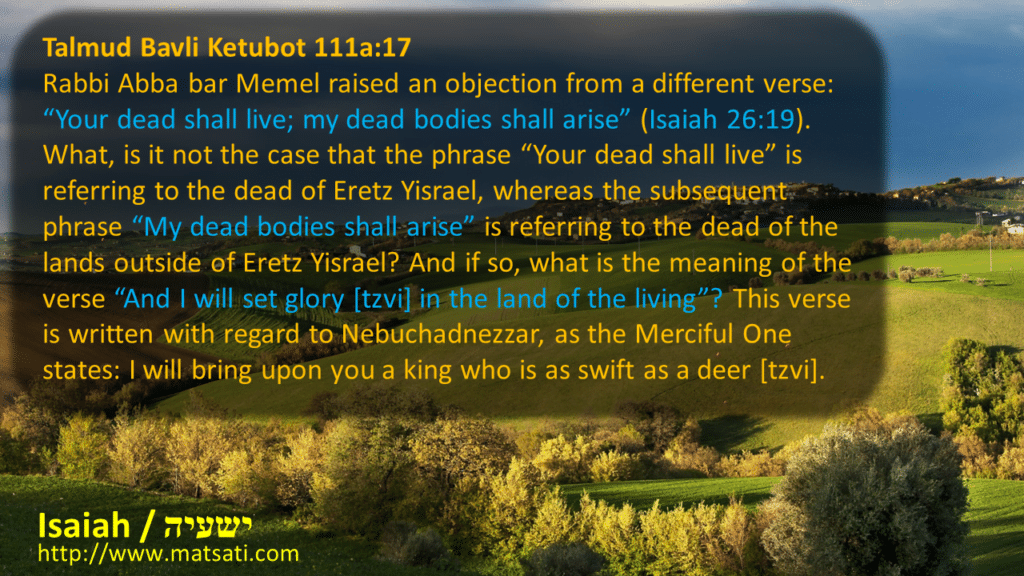
Talmud Bavli Ketubot 111a:17
Rabbi Abba bar Memel raised an objection from a different verse: “Your dead shall live; my dead bodies shall arise” (Isaiah 26:19). What, is it not the case that the phrase “Your dead shall live” is referring to the dead of Eretz Yisrael, whereas the subsequent phrase “My dead bodies shall arise” is referring to the dead of the lands outside of Eretz Yisrael? And if so, what is the meaning of the verse “And I will set glory [tzvi] in the land of the living”? This verse is written with regard to Nebuchadnezzar, as the Merciful One states: I will bring upon you a king who is as swift as a deer [tzvi].
This concept of joining with Israel is found in our becoming a part of the family of God. When we are adopted into the family of God, we are living in the same household, and therefore like any earthly household, there are rules for living as an adopted child. We don’t have the option to act in any way that is outside of what God expects of us. Today, the theologies that say that the Torah has passed away, presupposes that an adopted child can behave however he likes without want or regard for the one who adopted him or her. These concepts naturally draw upon the Torah centric idea we discussed previously of listening to the voice of God! When we consider these truths taught in the Scripture, modern theologies that are so anti-Torah are a significant problem. Considering the words of Isaiah, logically, we are expected to live our lives according to God’s word, this is a natural way of thinking about it. The reason being, this is how it works here on earth, and so there is logically a spiritual parallel for the lives of those who seek to draw near to the Lord God in heaven, have faith in Yeshua the Messiah, and seek to be a part of the Kingdom of God!
Isaiah goes on saying according to the TgJ, כ אִיזֵיל עַמִי עְבֵיד לָך עוּבָדִין טָבִין דְיַגְנוּן עְלָך בְעִדָן עָקָא אִיטְמַר כִזעֵיר זְמָן עַד דְיִעדֵי לְוָט׃ 26:20 Come, O my people; produce for thyself good works, which shall protect thee in the time of distress: hide thyself as it were for a little moment, until the curse shall have passed away. כא אְרֵי הָא יוי מִתגְלֵי מֵאְתַר בֵית שְכִינְתֵיה לְאַסעָרָא חֹוב יָתֵיב אַרעָא עְלֹוהִי וּתגַלֵי אַרעָא עַל דַם זַכַי דְאִתאְשַד בַה וְלָא תְכַסֵי עֹוד עַל קְטִילַהָא׃ 26:21 For, behold, the Lord is revealing himself from the place of his Shekinah, to punish the inhabitants of the earth for their sins; and the earth shall disclose the innocent blood that was shed in her, and shall no more cover her slain. (TgJ) This concept from the TgJ regarding good works as it says in Aramaic עוּבָדִין טָבִין or in Hebrew מַעֲשִׂים טוֹבִים or in Greek ἔργοις ἀγαθοῖς, this reminds us of what Paul wrote to the Ephesians saying the following:
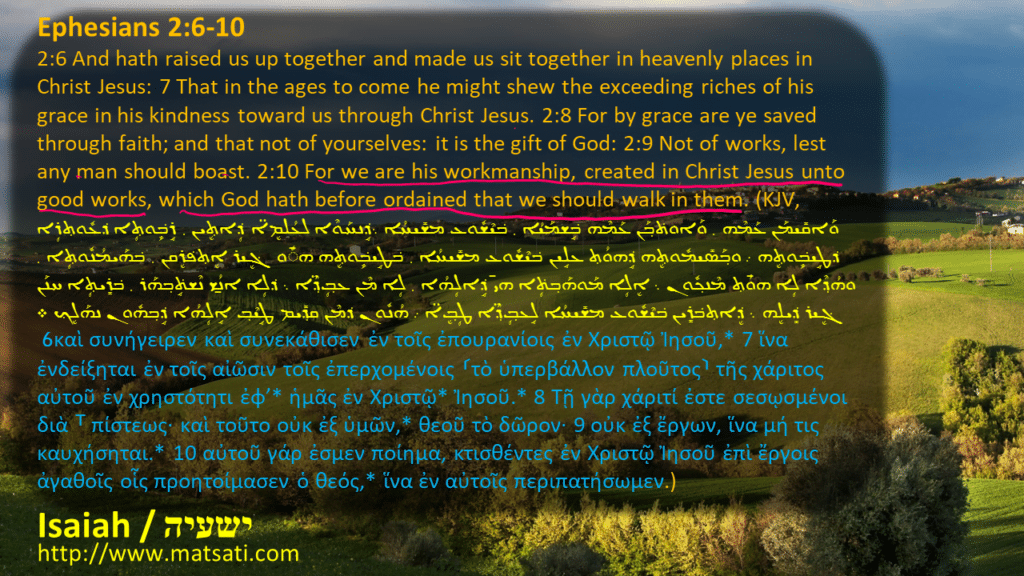
Ephesians 2:6-10
2:6 And hath raised us up together, and made us sit together in heavenly places in Christ Jesus: 7 That in the ages to come he might shew the exceeding riches of his grace in his kindness toward us through Christ Jesus. 2:8 For by grace are ye saved through faith; and that not of yourselves: it is the gift of God: 2:9 Not of works, lest any man should boast. 2:10 For we are his workmanship, created in Christ Jesus unto good works, which God hath before ordained that we should walk in them. (KJV, ܘܰܐܩܺܝܡܰܢ ܥܰܡܶܗ ܂ ܘܰܐܘܬ݁ܒ݂ܰܢ ܥܰܡܶܗ ܒܱ݁ܫܡܰܝܳܐ ܂ ܒ݁ܝܶܫܽܘܥ ܡܫܺܝܚܳܐ ܆ܕܱ݁ܢܚܰܘܶܐ ܠܥܳܠܡܷ̈ܐ ܕܴ݁ܐܬ݂ܷܝܢ ܂ ܪܱܒܾ݁ܘܬ݂ܴܐ ܕ݁ܥܽܘܬ݂ܪܴܐ ܕ݁ܛܱܝܒܾ݁ܘܬ݂ܷܗ ܇ ܘܒ݂ܰܣܺܝܡܽܘܬ݂ܷܗ ܕܱ݁ܗܘܳܬ݂ ܥܠܱܝܢ ܒ݁ܝܶܫܽܘܥ ܡܫܺܝܚܳܐ ܂ ܒ݁ܛܱܝܒܾ݁ܘܬ݂ܷܗ ܗ̄ܽܘ ܓܷ݁ܝܪ ܐܷܬ݂ܦ݁ܪܷܩܢ ܂ ܒ݁ܗܰܝܡܳܢܽܘܬ݂ܴܐ ܂ ܘܗܳܕ݂ܶܐ ܠܴܐ ܗ̄ܘܳܬ݂ ܡܶܢܟ݂ܽܘܢ ܆ ܐܷܠܴܐ ܡܰܘܗܰܒ݂ܬܴ݁ܐ ܗ̄ܝ ܕܱ݁ܐܠܴܗܳܐ ܂ ܠܴܐ ܡܶܢ ܥܒ݂ܴ̈ܕ݂ܶܐ ܆ ܕ݁ܠܴܐ ܐ̱ܢܳܫ ܢܶܫܬܱ݁ܒ݂ܗܰܪ ܂ ܒ݁ܪܻܝܬ݂ܴܐ ܚܢܰܢ ܓܷ݁ܝܪ ܕܻ݁ܝܠܷܗ ܆ ܕܷ݁ܐܬ݂ܒ݁ܪܻܝܢ ܒ݁ܝܶܫܽܘܥ ܡܫܺܝܚܳܐ ܠܱܥܒ݂ܴ̈ܕ݂ܶܐ ܛܴܒ݂ܷ̈ܐ ܇ ܗܳܢܽܘܢ ܕ݁ܡܶܢ ܩܕ݂ܺܝܡ ܛܱܝܶܒ݂ ܐܱܠܴܗܳܐ ܕܱ݁ܒ݂ܗܽܘܢ ܢܗܰܠܷܟ݂ ܀ 6 καὶ συνήγειρεν καὶ συνεκάθισεν ἐν τοῖς ἐπουρανίοις ἐν Χριστῷ Ἰησοῦ,* 7 ἵνα ἐνδείξηται ἐν τοῖς αἰῶσιν τοῖς ἐπερχομένοις ⸂τὸ ὑπερβάλλον πλοῦτος⸃ τῆς χάριτος αὐτοῦ ἐν χρηστότητι ἐφʼ* ἡμᾶς ἐν Χριστῷ* Ἰησοῦ.* 8 Τῇ γὰρ χάριτί ἐστε σεσῳσμένοι διὰ ⸆ πίστεως· καὶ τοῦτο οὐκ ἐξ ὑμῶν,* θεοῦ τὸ δῶρον· 9 οὐκ ἐξ ἔργων, ἵνα μή τις καυχήσηται.* 10 αὐτοῦ γάρ ἐσμεν ποίημα, κτισθέντες ἐν Χριστῷ Ἰησοῦ ἐπὶ ἔργοις ἀγαθοῖς οἷς προητοίμασεν ὁ θεός,* ἵνα ἐν αὐτοῖς περιπατήσωμεν.)
This draws in the concept of Chassidut (חסידות) meaning “piety” or “lovingkindness” as a way of life that goes beyond the letter of the law. Note how many times Yeshua demonstrated this during his ministry and in his commands towards his followers! Chassidut is an 18th century movement within Judaism and was founded by the Ba’al Shem Tov. This movement sought to consider the inner application of the Torah to prepare for the coming of the Messiah. Part of the aspect of Chassidim movement is Tikkun Olam (תיקון עולם) repair of the world through maasim tovim מַעֲשִׂים טוֹבִים (good deeds) for the sake of returning the world to God. This involves Middot (מידות הלב) transforming the heart to fear and love God and living as a Tzaddik (צדיק) to walk in God’s holy and righteous ways. Here the TgJ describes good deeds as protecting one during difficult times. The major point that may be presented here is to recognize that we are sinful, that we need the help of God to overcome this world, and that we need His Messiah Yeshua! We note what Yeshua and his disciples said according to the NT text. Yeshua promised his followers, “In the world you will have tribulation.” (John 16:33) Yeshua overcame the world, and so we can look to Him for help in our situations, such as what Isaiah is saying, continuing to live our lives according to God’s word is to “hide thyself as it were for a little moment, until the curse shall have passed away.” Paul writes something very similar to the Romans, according to Romans 12 that we should “not be overcome by evil but overcome evil with good.” (Romans 12:21) Yeshua also taught such a principle, saying that we can overcome the allure of the world by doing good for those in the world (see Matthew 25). Yeshua also said, “Love your enemies, do good to those who hate you,” (Luke 6:27) and he went even further saying, “Bless those who curse you, pray for those who abuse you.” (Luke 6:28) Notice how this is the concept of Tikkun Olam (תיקון עולם) and maasim tovim מַעֲשִׂים טוֹבִים (good deeds). Peter wrote that “whatever overcomes a person, to that he is enslaved.” (2 Peter 2:19) The concept here is that we do not respond to evil with evil. We trust in the Lord that he will take care of us. (Romans 12:17-21) As God’s children, we are called to be different. The value of walking in God’s ways and not looking back are found in the epistle of Peter which warns that if “they have escaped the defilements of the world through the knowledge of our Lord and Savior Jesus Christ, they are again entangled in them and overcome, the last state has become worse for them than the first.” (2 Peter 2:20) The major point and application is to strive for the righteousness of God, to repent, and seek the help of God in all things!
